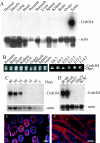Reduction of spermatogenesis but not fertility in Creb3l4-deficient mice
- PMID: 16107712
- PMCID: PMC1190296
- DOI: 10.1128/MCB.25.17.7657-7664.2005
Reduction of spermatogenesis but not fertility in Creb3l4-deficient mice
Abstract
Creb3l4 belongs to the CREB/ATF family of transcription factors that are involved in mediating transcription in response to intracellular signaling. This study shows that Creb3l4 is expressed at low levels in all organs and in different stages of embryogenesis but is present at very high levels in the testis, particularly in postmeiotic male germ cells. In contrast to CREB3L4 in the human prostate, of which specific expression was detected, Creb3l4 transcripts in the mouse prostate could be detected only by RT-PCR. To identify the physiological function of Creb3l4, the murine gene was inactivated by replacement with the gene encoding green fluorescent protein. Surprisingly, Creb3l4-deficient mice were born at expected ratios, were healthy, and displayed normal long-term survival rates. Despite a significant reduction in the number of spermatozoa in the epididymis of Creb3l4(-)(/)(-) mice, the breeding of mutant males with wild-type females was productive and the average litter size was not significantly altered in comparison to wild-type littermates. Further analyses revealed that the seminiferous tubules of Creb3l4(-)(/)(-) mice contained all of the developmental stages, though there was evidence for increased apoptosis of meiotic/postmeiotic germ cells. These results suggest that Creb3l4 plays a role in male germ cell development, but its loss is insufficient to completely compromise the production of spermatozoa.
Figures




References
-
- Aho, H., M. Schwemmer, D. Tessman, D. Murphy, G. Mattei, W. Engel, and I. M. Adham. 1996. Isolation, expression, and chromosomal localization of the human mitochondrial capsule selenoprotein gene (MCSP). Genomics 32:184-190. - PubMed
-
- Blendy, J. A., K. H. Kaestner, G. F. Weinbauer, E. Nieschlag, and G. Schutz. 1996. Severe impairment of spermatogenesis in mice lacking the CREM gene. Nature 380:162-165. - PubMed
-
- Cohen, P. E., O. Chisholm, R. J. Arceci, E. R. Stanley, and J. W. Pollard. 1996. Absence of colony-stimulating factor-1 in osteopetrotic (csfmop/csfmop) mice results in male fertility defects. Biol. Reprod. 55:310-317. - PubMed
-
- De Cesare, D., and P. Sassone-Corsi. 2000. Transcriptional regulation by cyclic AMP-responsive factors. Prog. Nucleic Acid Res. Mol. Biol. 64:343-369. - PubMed
-
- De Graeve, F., A. Bahr, B. Chatton, and C. Kedinger. 2000. A murine ATFa-associated factor with transcriptional repressing activity. Oncogene 19:1807-1819. - PubMed
Publication types
MeSH terms
Substances
LinkOut - more resources
Full Text Sources
Molecular Biology Databases
